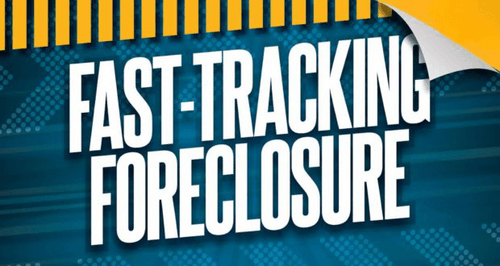Title: A Guide to Fast-Track Foreclosure Processes
Introduction: Foreclosure is a legal process that allows a lender to recover the amount owed on a defaulted loan by selling or repossessing the property. Traditionally, foreclosure processes can be lengthy and complex, involving various legal steps and extensive timelines. However, in recent years, fast-track foreclosure processes have gained popularity due to their ability to expedite the foreclosure proceedings. In this blog post, we will provide you with a comprehensive guide to fast-track foreclosure processes, including an overview of the benefits, common requirements, and important considerations.
Understanding Fast-Track Foreclosure: Fast-track foreclosure refers to a streamlined and accelerated foreclosure process that aims to minimize the time and effort required to complete the foreclosure proceedings. These processes are designed to reduce the backlog of foreclosure cases and provide a more efficient resolution for lenders seeking to recover their investment. Fast-track foreclosures typically involve specific legislative provisions or alternative foreclosure methods that expedite the legal process.
Benefits of Fast-Track Foreclosure Processes:
- Time-saving: The primary advantage of fast-track foreclosure processes is the significant reduction in the time required to complete the foreclosure. This allows lenders to regain possession of the property and recoup their losses more quickly.
- Cost-efficiency: By expediting the foreclosure process, fast-track procedures can potentially save lenders money by minimizing legal fees, property maintenance costs, and the overall time spent on the foreclosure.
- Reduced legal complexities: Fast-track processes often simplify legal requirements and eliminate certain steps, making it easier for lenders to navigate the foreclosure process. This can help minimize the potential for legal challenges and delays.
Common Requirements for Fast-Track Foreclosure: While the specific requirements may vary depending on jurisdiction, here are some common elements that are often associated with fast-track foreclosure processes:
- Strict default criteria: Fast-track foreclosures typically require clear and unambiguous evidence of default on the part of the borrower, such as missed payments or other violations of the loan agreement.
- Notice and disclosure requirements: Lenders are usually required to provide timely and accurate notices to borrowers, informing them of their default and the impending foreclosure proceedings.
- Limited redemption periods: In some cases, fast-track foreclosure processes may shorten the borrower’s redemption period, which is the period during which they can reclaim the property by paying the outstanding debt.
- Expedited court procedures: Fast-track foreclosures often involve streamlined court procedures, including shorter timelines for filing documents, scheduling hearings, and obtaining judgments.
- Alternative dispute resolution: Some jurisdictions encourage or require lenders and borrowers to engage in alternative dispute resolution methods, such as mediation or negotiation, to expedite the foreclosure process.
Important Considerations:
- Legal advice: It is crucial for lenders to seek legal advice from professionals experienced in fast-track foreclosure processes. This will help ensure compliance with local laws and regulations, as well as maximize the chances of a successful and efficient foreclosure.
- Jurisdiction-specific regulations: Fast-track foreclosure processes can differ significantly from one jurisdiction to another. Lenders must familiarize themselves with the specific laws and regulations governing foreclosures in their area to understand the available options and requirements.
- Borrower rights: While fast-track foreclosure processes aim to expedite the resolution for lenders, it is essential to be mindful of borrower rights. Lenders must adhere to all legal requirements and provide borrowers with the necessary notifications and opportunities to resolve the default if available.
- Potential challenges: Despite the benefits, fast-track foreclosure processes may face certain challenges, such as potential objections from borrowers, legal complexities in specific cases, or the need for further court involvement. Lenders should be prepared for these challenges and have contingency plans in place.
Conclusion: Fast-track foreclosure processes provide lenders with an efficient and streamlined method to recover their investments in the
.

